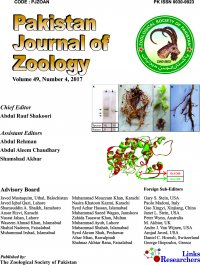Supplementation of Moderate and High Doses of Vitamin E in the Practical Diet of Labeo rohita: Effects on Growth, Proximate Composition, Lipid Peroxidation and Fatty Acid Profile
Supplementation of Moderate and High Doses of Vitamin E in the Practical Diet of Labeo rohita: Effects on Growth, Proximate Composition, Lipid Peroxidation and Fatty Acid Profile
Mahroze Fatima1*, Syed Zakir Hussain Shah2, Muhammad Afzal3, Muhammad Bilal4 and Ayesha Khizar1
ABSTRACT
Vitamin supplementation beyond the requirement level show therapeutic effect. Vitamin E being an antioxidant has become very attractive to reduce oxidation and improve overall performance of fish. Two adequate (100, 150 mg/kg) and two high levels (1000, 1500 mg/kg) of vitamin E with a control level (0 mg/kg) were analyzed in this study. Results showed that adequate levels of supplementation increased growth performance compared to higher levels. The minimum value of thiobarbituric acid reactive substances (TBARS) was recorded in 100 mg/kg vitamin E supplemented group, which started to increase gradually with increase in vitamin E level. Supplementation of vitamin E lowered the antioxidant enzyme (superoxide dismutase, catalase and peroxidase) activities, however the higher doses did not outperform the moderate doses. Saturated fatty acids and monoenes were more in fish fed the control diet compared to vitamin E fed fish. The percentages of 18:3n-6 (linolenic acid), 20:5n-3 (eicosapentaenoic acid), 22:5n-3 (docosapentaenoic acid), 22:6n-3 (docosahexaenoic acid), total n-3 and n-6 polyunsaturated fatty acids were found higher in diets enriched with vitamin E than in the control group. To conclude, dietary supplementation with vitamin E has been shown to improve the growth and antioxidant status of fish. Nevertheless, high doses of vitamin E showed the pro-oxidative effect that favored lipid peroxidation, resulting in a decreased growth rate.
To share on other social networks, click on any share button. What are these?









